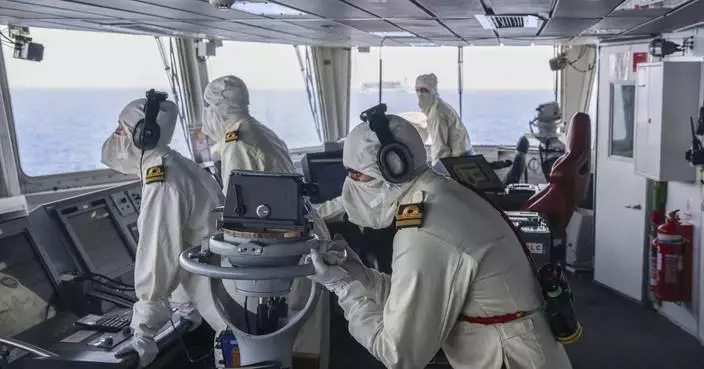Yemen's central bank dismissed United Nations allegations that the Yemeni government misused millions of dollars donated by Saudi Arabia to buy essential commodities for the Yemeni people
A report by a panel of U.N. experts released to the media this week accused the internationally recognized government of implementing a scheme to illegally divert to traders $423 million in Saudi money.
The report says the funds were meant to buy rice and other supplies for Yemenis suffering from the country's six-year civil war.
“The government of Yemen is, in some cases, engaging in money-laundering and corruption practices that adversely affect access to adequate food supplies for Yemenis, in violation of the right to food,” the panel said.
The Central Bank of Yemen said Wednesday the report was based on “misleading claims and information” propagated by “enemies of Yemen.”
The Yemeni government had not responded to the report as of Thursday afternoon.
According to the U.N. report, the $423 million scheme involved illegally transferring public money to traders, with 48% going to a single holding corporation, the Hayel Saeed Anam Group, known as HSA.
The HSA Group said in a statement the allegations were “baseless” and denied them “in the strongest terms.”
The CBY said the Saudi money was disbursed according to “highly transparent procedures” that met international standards of due diligence, according to an official statement.
The bank vowed to provide a thorough rebuttal backed by evidence and documents at a later stage, the statement said.
Yemen's conflict between a Saudi-led coalition supporting the internationally recognized government and the Iranian-backed Houthi rebels has been catastrophic, killing more than 112,000 people. It has created the world’s worst humanitarian crisis, brought Yemen to the brink of famine and wrecked infrastructure.
The war began with the 2014 Houthi takeover of the north, where the majority of Yemenis live, including the capital, Sanaa. This prompted a destructive air campaign by the Saudi-led coalition the following year, aimed at restoring the government.
The U.N. experts also accused the Houthi rebels of diverting at least $1.8 billion in aid funds in 2019 that was supposed to go to the government to pay salaries and provide basic services to citizens.
The report said the Houthis perform government functions including collecting taxes and other state revenue, “a large portion of which is used to fund their war effort” — not to help the Yemeni people.
JERUSALEM (AP) — The head of the United Nations' nuclear watchdog will travel to Iran next week as Tehran's nuclear program enriches uranium a step away from weapons-grade levels and international oversight remains limited, officials said Wednesday.
Rafael Mariano Grossi's visit will coincide with a nuclear energy conference Iran will hold in the central city of Isfahan, which hosts sensitive enrichment sites and was targeted in an apparent Israeli attack on April 19. It also coincides with wider regional tensions in the Mideast inflamed by the Israel-Hamas war in the Gaza Strip, including attacks on shipping by Iranian-backed Houthi rebels in Yemen.
The director-general of the International Atomic Energy Agency will visit Iran on May 6 and 7, the Vienna-based agency said. It did not elaborate on his schedule or his meetings.
Iranian state television has described the conference in Isfahan as an “international conference on nuclear sciences and techniques.” The broadcaster quoted Mohammed Eslami, the head of Iran's civilian nuclear program, as saying on Wednesday that Grossi will attend the conference and meet with him and other officials.
“I am sure that the ambiguities will be resolved and we can strengthen our relations with the agency within the framework of safeguards and” the Nuclear Non-Proliferation Treaty, Eslami said.
Tensions have only grown between Iran and the IAEA since then-President Donald Trump in 2018 unilaterally withdraw America from Tehran's nuclear deal with world powers. Since then, Iran has abandoned all limits the deal put on its program and now has enough enriched uranium for “several” nuclear bombs if it chose to build them, Grossi has warned.
IAEA surveillance cameras have been disrupted, while Iran has barred some of the agency's most experienced inspectors. Iranian officials have increasingly threatened they could pursue atomic weapons, particularly after launching an unprecedented drone-and-missile attack on Israel last month.
Iran has always denied seeking nuclear weapons, saying its atomic program is for purely civilian purposes. However, U.S. intelligence agencies and the IAEA say Iran had an organized military nuclear program up until 2003.
The latest American intelligence community assessment says Iran “is not currently undertaking the key nuclear weapons-development activities necessary to produce a testable nuclear device.”
Associated Press writer Amir Vahdat in Tehran, Iran, contributed to this report.

FILE - International Atomic Energy Agency Director General Rafael Mariano Grossi waits to meet Japan's Prime Minister Fumio Kishida shakes hands at the prime minister's office in Tokyo Thursday, March 14, 2024. The head of the United Nations' nuclear watchdog will travel to Iran next week as Tehran's nuclear program enriches uranium a step away from weapons-grade levels and international oversight of the program remains limited, officials said Wednesday, May 1, 2024. (AP Photo/Eugene Hoshiko, Pool, File)










